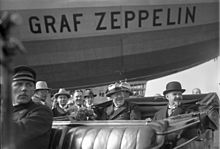Arthur Scholtz
Arthur Scholtz (born January 29, 1871 in Bythin , district of Samter , † May 14, 1935 in Berlin ) was acting Lord Mayor of Berlin from autumn 1929 to April 14, 1931, representing Gustav Böß .
Life
He was the son of a domain councilor. He attended school in Halle an der Saale . He then studied law and political science in Munich , Berlin and Breslau . He joined the Poznan City Administration in 1897 . As early as 1900 he was a paid city councilor and treasurer there . In 1903 he moved to Charlottenburg in the same position . He made a name for himself as an expert in municipal finance and was re-elected in 1915 for another 12-year term.
After the formation of Greater Berlin and the incorporation of Charlottenburg in 1920, he was proposed as a candidate for mayor's office by the DVP , of which he was a member, but was defeated. On February 9, 1921, he was elected District Mayor of Berlin-Charlottenburg . In 1924 he was elected mayor of Berlin. During this time he tried to adapt the administrative structures of the city to the new developments. The relationship with Lord Mayor Gustav Böß was tense at times. Boess had entrusted Scholtz with a difficult and thankless task with the assignment of the social and welfare department, whereby Scholtz proved to be quite competent. He reorganized welfare and had the municipal support system in the capital standardized.
During a trip to America by Gustav Boess, Scholtz became the acting Lord Mayor in November 1929. In this role he soon became a crisis manager. In the Sklarek scandal , it became known that the textile wholesalers Sklarek, with the help of bribed Berlin officials, had defrauded the city of around 10 million marks; on November 7, 1929, Boess resigned. The city administration, headed by Scholtz, was sharply criticized by the public, in particular from the KPD and the NSDAP . The extreme parties combined this with attacks on the Weimar Republic as a whole. Scholtz tried to protect Boess, but was soon attacked himself. The magistrate continued to support him.
The effects of the global economic crisis also made themselves felt. Soon 25% of Berlin's population were unemployed. This development also had catastrophic consequences for the Berlin budget. In 1929 the city was already in debt of 400 million marks. Scholtz gave the city some respite when he succeeded in obtaining new loans.
Soon further affairs complicated the local political situation. This included covert property purchases by the BVG without the knowledge of the city administration. The Prussian state government reacted to actual and alleged deficits in the Berlin administration with the draft of a "self-administration law for the capital Berlin". Without the involvement of the city council , the magistrate and the incumbent mayor, considerable changes should be introduced. In particular, the collegial body of the magistrate should be weakened in favor of strengthening the mayor's powers. Scholtz, who was only provisional mayor, saw the mayor's rights being curtailed as a result. He submitted his resignation, but continued to run the business until a successor to Böß was elected.
As early as 1924 he became the city elder of Berlin . He found his final resting place in the south-west cemetery in Stahnsdorf .
Web links
Individual evidence
- ^ Files of the district assembly Charlottenburg, district office, 1910–1925
| personal data | |
|---|---|
| SURNAME | Scholtz, Arthur |
| BRIEF DESCRIPTION | Mayor and Acting Lord Mayor of Berlin |
| DATE OF BIRTH | January 29, 1871 |
| PLACE OF BIRTH | Bythin |
| DATE OF DEATH | May 14, 1935 |
| Place of death | Berlin |
